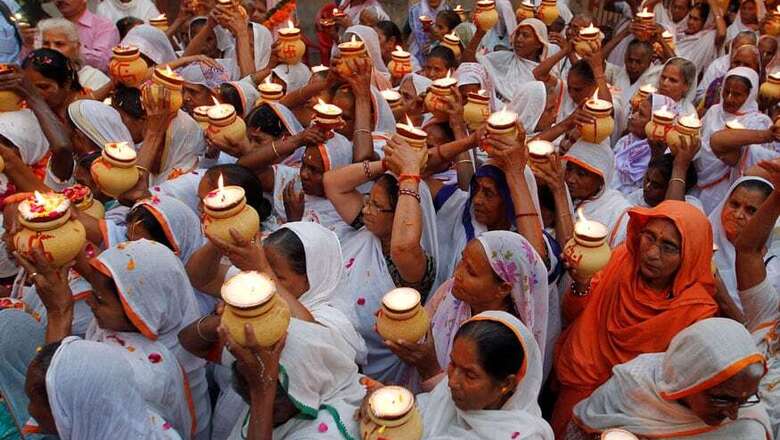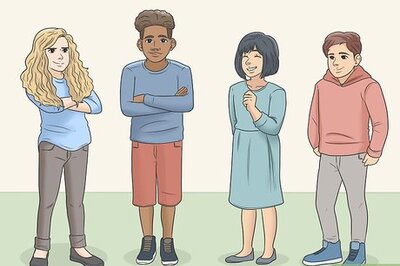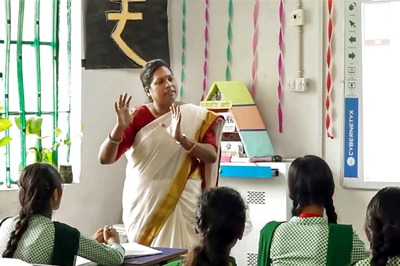
views
New Delhi: Can you recollect another time in the year when you would think or worry about the Vrindavan widows if it’s not Holi? Perhaps not. Because Holi is the only time when there’s an excellent photo-op for shutterbugs to catch these hapless women draped in white, enjoying a rare touch of colour. Otherwise, they are just spending their remaining days.
Widows living in Vrindavan have been rendered “invisible in the discourse on poverty” with the negligible data available on them. A Supreme Court-appointed panel to look into the rehabilitation of Vrindavan widows recently submitted its report and came up with the above observation and suggested that a ‘Widows’ Cell’ be framed to look at the shortcomings.
The panel members have further proposed that Census data should include “additional indicators on widows” apart from the constitution of ‘Widows’ Cells’ at the district, state and the national levels.
In August 2017, when the Supreme Court formed a panel to devise a working plan to uplift the condition of the widows of Vrindavan, the division bench of Justices Madan B Lokur and Deepak Gupta stressed that the committee should suggest ways to ‘encourage’ widow remarriage.
The six-member committee comprises Suneeta Dhar of NGO Jagori, Meera Khanna of Guild for Service, activist and lawyer Abha Singhal, lawyer Aparajita Singh and one nominee each from NGOs HelpAge India and Sulabh International.
The copy of the report, which has been accessed by News18, shows how the panel members had urged that data on widows be made available to fulfil the aim of their upliftment.
“The differing forms of violence against widows is known and still there is, astonishingly, very little data available. This is probably due to the myth that widows are taken care of by family households and so the deprivations of widows are well hidden in economic and social statistics. Without adequate data it will be impossible to underscore the economic, social and political vulnerabilities of widows. Dearth of data renders widows invisible in the discourse on poverty. Data on the status of the widows across a large sample size, indicating both core and relative deprivations can be both a management tool and a report card for conceptualizing, implementing and monitoring interventions to empower widows,” reads the report.
The panel suggests that “on registration of the death of a male, the name, age and contact details of the widow be recorded. The Registrar General of India should issue a direction to the states so that census data collection should be upgraded with additional indicators on widows. The database should be uploaded on the Ministry of WCD digital database.”
The expert panel has also found out that “widows were not a homogeneous group concentrated in the shelter homes alone as more than half of the widows surveyed reside independently and constitute the most neglected category.”
Further, the panel has proposed that a single window system be put in place for access of services and schemes meant for the widows. The ‘Widows’ Cell’ would have all shelter homes maintained by the Centre, state or an NGO, registered under it.
“A dedicated widows’ cell to be constituted at the District level under the District Legal Services Authority. Ministry of WCD has already formulated a One Stop Centre Scheme to converge services for women affected by violence and it would be integrated with the present recommendations,” the report proposes.
The panel has also proposed a hike in the food allowance for widows as the current Rs 1300 per month is not enough, according to a UP-based survey.
“Food allowance for widows is Rs 1300 per month and it needs revision. In a survey conducted by Mahila Kalyan Nigam, UP with HelpAge India, food requirement of a resident was Rs 4050 per month and hence widows’ food allowance needs revision,” notes the SC-appointed panel.
The Guild of Service, an NGO was also a part of the panel meeting that has called out for the dole scheme for widows to be stopped.
“The Guild of Service is against the practice of giving dole to underprivileged as it only reinforces the marginalized status of the widows. Pension as a social security intervention of Rs 5,000 payment to widows to meet their boarding expenses is a dole which will be an obstacle to empowerment and self-dependence,” reads the report.
















Comments
0 comment